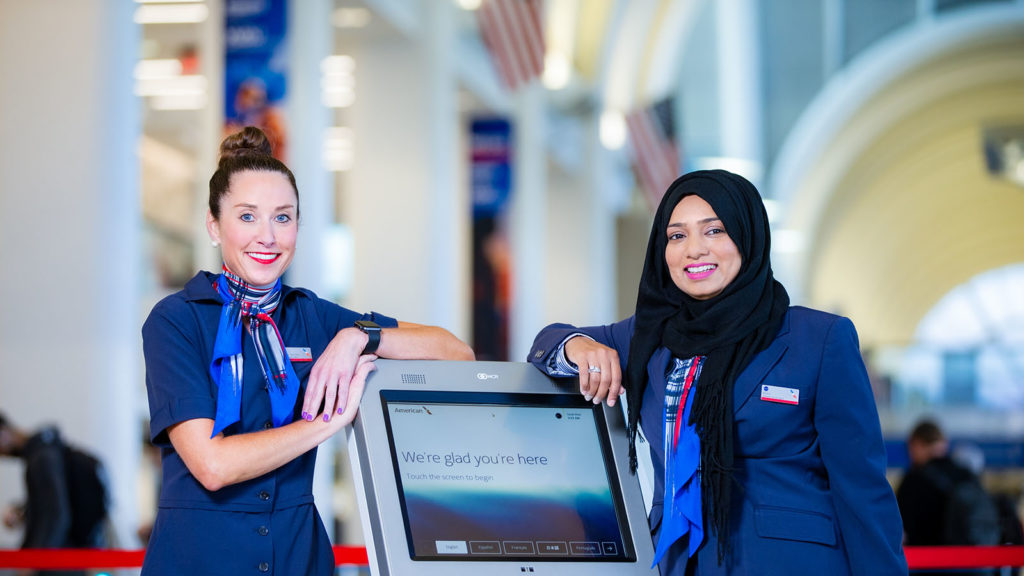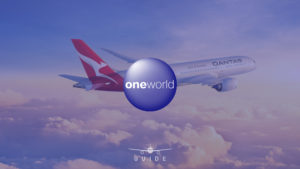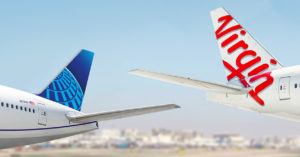Travelling with checked baggage can get quite expensive in the United States. It’s common to pay US$30-35 to bring along one checked bag, with even heftier fees applied to second and subsequent bags. But there are easy ways you can avoid paying these annoying checked baggage fees – and without limiting yourself to carry-on.
Whichever airline you prefer to fly with, here are five smart ways to side-step those charges for your checked bags.
Avoid baggage fees by booking domestic and international flights together
If you’re merely visiting the United States, the easiest way to avoid those pesky baggage fees is to book all your flights on a single ticket. Whether you’re connecting between flights or have time on the ground before you jet off again, keeping your flights on the one booking keeps your baggage allowance the same across the whole trip.
This little hack is known as the ‘most significant carrier’ rule. Without getting into the technicalities, it essentially means that whatever baggage allowance you had for the international leg – such as Australia to USA – also carries over to any domestic and other onward flights on the same booking.
It doesn’t matter whether you’ve booked your journey using points, cash or a combination of both. The only thing that matters is that your flights are together on a single booking.
Just note though, additional allowances provided based on frequent flyer status can differ between flights. For example, a Qantas Platinum member flying Qantas from Australia will often get a higher checked baggage allowance than stated on the ticket. But for the onward flight, the standard ‘ticketed’ allowance would apply by default. That onward airline is still free to provide extra baggage based on status – it just means that both airlines are working off the same base limit.
Either way, by keeping your flights on a single booking when travelling from Australia, you can expect at least one free checked bag for every hop along the trip. Even on domestic flights solely within the US, avoiding the checked baggage fees that’d normally apply.
Use your frequent flyer status to bypass checked baggage fees
It’s not always possible to book US domestic flights as part of your international ticket. And there are many reasons to reserve domestic legs separately – whether for ease of planning, accounting purposes on work travels, or even just simplicity. Personally, I often get my long-haul flights sorted before working out any shorter US domestic hops.
Having a shiny frequent flyer card makes that nice and easy – while still avoiding those annoying checked baggage fees.
It pays to remember that both American Airlines and Alaska Airlines are oneworld Alliance partners of Qantas. United Airlines also has a strategic partnership with Virgin Australia and Velocity Frequent Flyer – with United also being a Star Alliance member. Delta Air Lines is no longer a Velocity partner, but remains in the global SkyTeam Alliance.
All of these tie-ups provide ways to skirt the typical checked baggage fees. When travelling on US domestic Economy flights with no default checked baggage allowance, here’s what you could pack without paying an extra cent. Just note, we’re only going into the perks of partner status here. If you hold status directly with the operating airline, you’re already set.
Travelling with Qantas or other oneworld status
Your Qantas Frequent Flyer card could be the ticket to avoiding luggage fees in the United States. Here’s how that works based on your status and the operating airline.
| Complimentary baggage allowance via partner frequent flyer status | oneworld Ruby (e.g. Qantas Silver) | oneworld Sapphire (e.g. Qantas Gold) | oneworld Emerald (e.g. Qantas Platinum and above) |
| Flying on American Airlines (AA) | 1 x 23kg | 2 x 23kg (46kg total) | 3 x 32kg (96kg total) |
| Flying on Alaska Airlines (AS) | 2 x 23kg (46kg total) | 2 x 23kg (46kg total) | Most flights: 3 x 23kg (69kg total) Within Alaska only: 4 x 23kg (92kg total) |
As you can see, Alaska Airlines is more generous for Silver-grade members, while American is generally best for top-tier flyers given the more generous baggage weight. Being able to pack three very heavy bags on domestic flights that normally provide a 0kg baggage allowance is quite a perk!
There’s another advantage to booking with AA as well. If you have status on the date you book your flight, but lose that tier before you travel, AA will honour the baggage allowance as per your previous, higher status.
You’ll need to see an agent at the airport on the day you fly to get any fees waived – you can’t do this via the kiosks or online check-in. Of course, you’ll also be expected to provide proof of the status you held on the ‘ticketing date’ on your flight.
For instance, if you were Qantas Platinum (oneworld Emerald) when you booked the flight, but drop to Qantas Gold (oneworld Sapphire) before you take the flight, you can pack to the higher oneworld Emerald limits.
Avoiding checked baggage fees on United Airlines
Flying with United Airlines? There are a couple of ways to avoid baggage fees. One is to have Gold status (or higher) with Velocity Frequent Flyer. The other is to have Star Alliance Gold status with one of United’s other partners. You could even have that status via the HSBC Star Alliance Credit Card – one of its many perks.
HSBC Star Alliance Credit Card
Again, United also gives complimentary baggage as a benefit for members of its own frequent flyer program. But here’s what you can pack when your status comes via a partner airline, which would apply to more Australian travellers.
| Complimentary baggage allowance via partner frequent flyer status | Velocity Silver Star Alliance Silver | Velocity Gold Velocity Platinum Star Alliance Gold |
| Flying on United Airlines (UA) | No status entitlement | 1 x 23kg |
On the one hand, it certainly makes sense for United to give Velocity members the same baggage allowance as travellers from United’s other partners. But it must be said, United’s complimentary baggage allowance isn’t particularly generous here.
Fly with United as a Velocity Platinum member and you’re allowed only one bag on US domestic flights, which can’t be more than 23kg. By comparison, fly American as a Qantas Platinum member, and you’re allowed up to three bags. Each bag can also be up to 32kg, giving 96kg of potential free checked baggage on AA, versus 23kg total at United.
It’s also a shame that Velocity Silver members get no perks at all on United. When Velocity was partnered with Delta, the allowances for Velocity members matched what Delta gave its own elite members. That was 1 x 32kg for Velocity Silver, 2 x 32kg for Velocity Gold and 3 x 32kg for Velocity Platinum on US domestic flights.
Velocity’s other Stateside partner, Hawaiian Airlines, doesn’t provide any status-based benefits to Velocity members.
How to avoid checked baggage fees on Delta Air Lines
Now that Delta and Virgin Australia/Velocity are no longer partners, it’s harder to avoid paying checked baggage fees. But there are still ways about it.
One is to have status in Delta’s own frequent flyer program – which you could get via status match from Qantas or Velocity. This would unlock the same baggage allowances mentioned in the previous section. Otherwise, having SkyTeam Elite or Elite Plus status with any other partner can bring some savings.
On that front, Delta keeps things simple. Whether you have SkyTeam Elite or SkyTeam Elite Plus, you’ll get 1 x 23kg checked bag without charge on domestic Economy tickets that otherwise include no free baggage.
Also read: Flying Delta? Your best strategies for points and perks
Book all passengers on the same reservation
Particularly when relying on status to avoid those checked baggage fees, here’s another trick to keep up your sleeve. When there’s more than one person travelling, book everybody on the same ticket. At the airport, also check-in at the same time.
When this happens, you normally benefit from your entire combined allowance being pooled together. For instance, one member in the group may qualify for three free checked bags, but only be travelling with one suitcase. Two others on the same booking may each have a bag, but no status or baggage entitlement. Check-in together, and you’ll get all three bags checked in, with nothing to pay.
This trick often works outside the US too, and can be especially handy with airlines that use the ‘weight’ allowance. Say, when two passengers each have a 30kg baggage allowance, and one is travelling with 2 x 20kg bags. If checking in alone, they’d be 10kg overweight. But if the other passenger only had 20kg of baggage, checking-in together means no extra fees.
Sometimes, you can even be even luckier – and not in an ‘official’ sense. I recently took a flight in the US where I had an allowance of two complimentary checked bags, my companion had no free baggage, but we had three bags total between us. At the priority check-in counter, the agent used their discretion to duplicate my elite baggage allowance over to my companion as well. It wasn’t official policy – just a nice gesture that saved us nearly AU$50 in fees.
Consider flying domestic First Class just for the baggage allowance
On US domestic flights, there isn’t often a ‘Business Class’ cabin. The seats up front are instead branded as ‘First Class’ – and while the seat still looks like Business Class, the baggage allowance can be generous.
What’s more, First Class fares aren’t always exceedingly expensive. The price difference between a First Class booking, and buying Economy and then paying checked baggage fees, can be minimal. For instance, on a recent Hawaiian Airlines trip, First Class was just US$40 more than ‘Economy + bags’.
Don’t want to pay for First Class outright? Consider using your frequent flyer points instead. Reward bookings in First Class include the same baggage allowance as revenue tickets, so you can pack without worry.
On American, Delta, Hawaiian and United, First Class includes at least 2 x 32kg bags at no charge. On Alaska Airlines, it’s 2 x 23kg – but that’s still better than no free bags in Economy. If you’re on American Airlines and flying Flagship First (available on routes where Business Class is sold as a separate cabin), you can even pack 3 x 32kg bags.
Fly Southwest
Paying for checked bags is very common in the US – and there are certainly many ways to avoid those fees. But if you prefer to keep things simple, there’s another option. By booking flights with Southwest, you can avoid checked baggage fees entirely, as Economy tickets include free baggage.
In fact, Southwest allows 2 x 23kg bags for every passenger on every flight. You don’t have to book a specific fare type to qualify, or be flying to a particular destination. As long as you’re flying Southwest, your first two bags are free – up to 23kg a pop.
As with the other airlines above, fees apply when bags are heavier than the allotted allowance. Charges also apply if bringing baggage in a quantity beyond the entitled limit.
Summing up
Low-cost airlines aside, many Australian travellers would expect free checked bags aboard full service airlines. But in the United States, checked baggage fees are the norm. As we’ve detailed above, there are fortunately many clever ways to avoid those fees.
Personally, I’m a big fan of the generous checked baggage allowances on American Airlines. When flying within North America, I’ll often preference AA over other carriers for the baggage limits alone. Not to mention, the more generous lounge access policies for frequent flyers visiting the United States – but that’s a topic for another day.
Also read: What’s the difference between American Airlines’ Admirals Club and Flagship Lounge?
Feature image courtesy of American Airlines.
Stay up to date with the latest news, reviews and guides by subscribing to Point Hacks’ email newsletter.





I’ve just booked 6 domestic flights in the USA through Qantas on AA. My husband and I are both silver Qantas status, although I think mine will drop down before we travel.
In your experience can we confidently assume we each get a checked bag per flight?
When I look at the booking in my qantas app is says ‘0’ checked bags.
Do you think it’s worth contacting AA to confirm one world baggage allowance?
Thanks.
Did you ever get clarification if you get free checked baggage?
Additionally question to others, does this rule still apply? I am having trouble working out if AA will honour Ruby status for 1 free checked bag. This is for stand alone domestic bookings in the USA using Qantas reward points. (it is not linked to any other itinerary)
Cheers